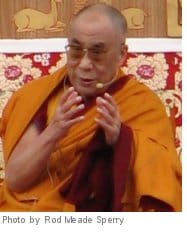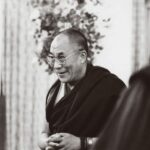How do we reconcile religious pluralism, so necessary in today’s world, with deep commitment to our own faith? The Dalai Lama offers his solution.
 For many religious people, accepting the legitimacy of other faith traditions poses a serious challenge. To accept that other religions are legitimate may seem to compromise the integrity of one’s own faith, since it entails the admission of different but efficacious spiritual paths. A devout Buddhist might feel that acceptance of other spiritual paths as valid suggests the existence of ways other than of the Buddha toward the attainment of enlightenment. A Muslim might feel that acceptance of other traditions as legitimate would require relinquishing the belief that God’s revelation to the Prophet, as recorded in the Qur’an, represents the final revelation of the highest truth. In the same vein, a Christian might feel that accepting the legitimacy of other religions would entail compromising the key belief that it is only through Jesus Christ that the way to God is found. So the encounter with an entirely different faith, which one can neither avoid nor explain away, poses a serious challenge to deep assumptions.
For many religious people, accepting the legitimacy of other faith traditions poses a serious challenge. To accept that other religions are legitimate may seem to compromise the integrity of one’s own faith, since it entails the admission of different but efficacious spiritual paths. A devout Buddhist might feel that acceptance of other spiritual paths as valid suggests the existence of ways other than of the Buddha toward the attainment of enlightenment. A Muslim might feel that acceptance of other traditions as legitimate would require relinquishing the belief that God’s revelation to the Prophet, as recorded in the Qur’an, represents the final revelation of the highest truth. In the same vein, a Christian might feel that accepting the legitimacy of other religions would entail compromising the key belief that it is only through Jesus Christ that the way to God is found. So the encounter with an entirely different faith, which one can neither avoid nor explain away, poses a serious challenge to deep assumptions.
This raises these critical questions: Can a single-pointed commitment to one’s own faith coexist with acceptance of other religions as legitimate? Is religious pluralism impossible from the perspective of a devout person who is strongly and deeply committed to his or her own faith tradition?
Yet without the emergence of a genuine spirit of religious pluralism, there is no hope for the development of harmony based on true interreligious understanding.
Historically, religions have gone to great lengths, even waging wars, to impose their version of what they deem to be the one true way. Even within their own fold, religions have harshly penalized those heterodox or heretical voices that the tradition took as undermining the integrity of the inviolable truths that the specific faith represents. The entire ethos of missionary activity—that is, the focus on bringing about active conversion of people from other faiths or no faiths—is grounded in the ideal of bringing the “one true way” to those whose eyes remain unopened. In a sense, one might even say that there is an altruistic motive underlying this drive to convert others to one’s own faith.
Given this history and given the perception of conflict that many religious people feel between maintaining the integrity of their own faith and the acceptance of pluralism, is the emergence of genuine interreligious harmony based on mutual understanding possible at all? Scholars of religion speak of three different ways in which a follower of a particular faith tradition may relate to the existence of other faith traditions. One is a straightforward exclusivism, a position that one’s own religion is the only true religion and that rejects, as it were by default, the legitimacy of other faith traditions. This is the standpoint adopted most often by the adherents of the religious traditions. Another position is inclusivism, whereby one accords a kind of partial validity to other faith traditions but maintains that their teachings are somehow contained within one’s own faith tradition—a position historically characterized by some Christian responses to Judaism and Islam’s relation to both Judaism and Christianity. Though more tolerant than the first position, this second standpoint ultimately suggests the redundancy of other faith traditions. Finally, there is pluralism, which accords validity to all faith traditions.
So, with these considerations as background, how does a follower of a particular religious tradition deal with the question of the legitimacy of other religions? On the doctrinal level, this is a question of how to reconcile two seemingly conflicting perspectives that pertain to the world’s religious traditions. I often characterize these two perspectives as “one truth, one religion” versus “many truths, many religions.” How does a devout person reconcile the perspective of “one truth, one religion” that one’s own teachings appear to proclaim with the perspective of “many truths, many religions” that the reality of the human world undeniably demands?
As many religious believers feel, I would agree that some version of exclusivism—the principle of “one truth, one religion”—lies at the heart of most of the world’s great religions. Furthermore, a single-pointed commitment to one’s own faith tradition demands the recognition that one’s chosen faith represents the highest religious teaching. For example, for me Buddhism is the best, but this does not mean that Buddhism is the best for all. Certainly not. For millions of my fellow human beings, theistic forms of teaching represent the best path. Therefore, in the context of an individual religious practitioner, the concept of “one truth, one religion” remains most relevant. It is this that gives the power and single-pointed focus of one’s religious path. At the same time, it is critical that the religious practitioner harbors no egocentric attachment to his faith.
Excerpted from Toward a True Kinship of Faiths: How the World’s Religions Can Come Together, by His Holiness the Dalai Lama. © 2010 by His Holiness the Dalai Lama. Reprinted with permission from Doubleday Religion

